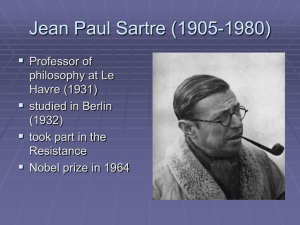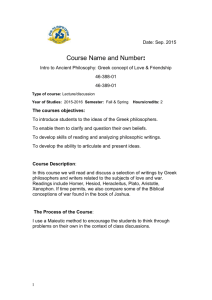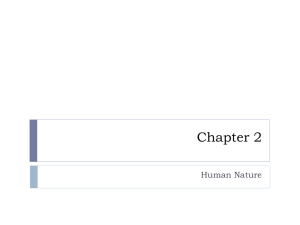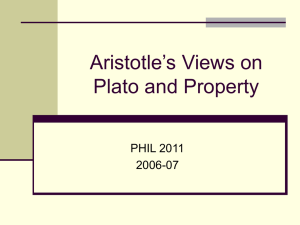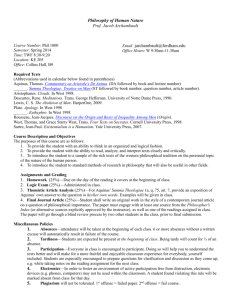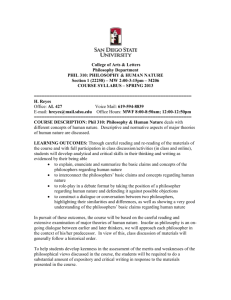Phil 101 Intro to Philosophy: Ethics (Reyes) (F 2013)
advertisement
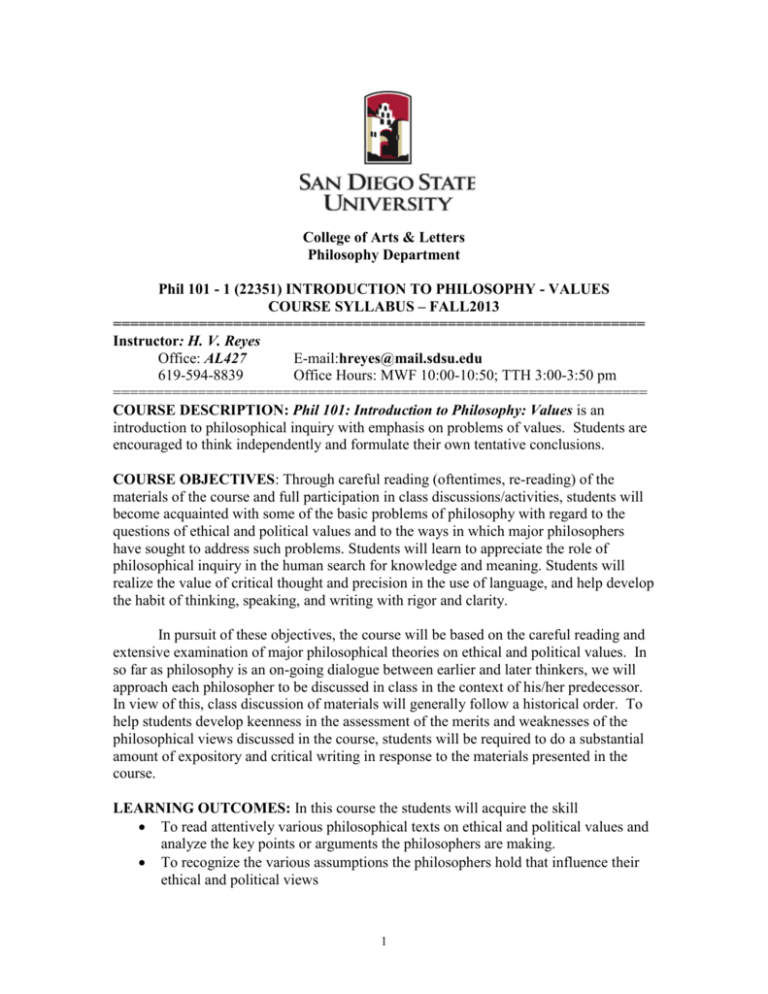
College of Arts & Letters Philosophy Department Phil 101 - 1 (22351) INTRODUCTION TO PHILOSOPHY - VALUES COURSE SYLLABUS – FALL2013 ============================================================== Instructor: H. V. Reyes Office: AL427 E-mail:hreyes@mail.sdsu.edu 619-594-8839 Office Hours: MWF 10:00-10:50; TTH 3:00-3:50 pm =============================================================== COURSE DESCRIPTION: Phil 101: Introduction to Philosophy: Values is an introduction to philosophical inquiry with emphasis on problems of values. Students are encouraged to think independently and formulate their own tentative conclusions. COURSE OBJECTIVES: Through careful reading (oftentimes, re-reading) of the materials of the course and full participation in class discussions/activities, students will become acquainted with some of the basic problems of philosophy with regard to the questions of ethical and political values and to the ways in which major philosophers have sought to address such problems. Students will learn to appreciate the role of philosophical inquiry in the human search for knowledge and meaning. Students will realize the value of critical thought and precision in the use of language, and help develop the habit of thinking, speaking, and writing with rigor and clarity. In pursuit of these objectives, the course will be based on the careful reading and extensive examination of major philosophical theories on ethical and political values. In so far as philosophy is an on-going dialogue between earlier and later thinkers, we will approach each philosopher to be discussed in class in the context of his/her predecessor. In view of this, class discussion of materials will generally follow a historical order. To help students develop keenness in the assessment of the merits and weaknesses of the philosophical views discussed in the course, students will be required to do a substantial amount of expository and critical writing in response to the materials presented in the course. LEARNING OUTCOMES: In this course the students will acquire the skill To read attentively various philosophical texts on ethical and political values and analyze the key points or arguments the philosophers are making. To recognize the various assumptions the philosophers hold that influence their ethical and political views 1 To realize the value of critical thought and precision in the use of language, and help develop the habit of thinking, speaking, and writing with rigor and clarity To think critically and develop the habit of thinking, speaking, and writing with rigor and clarity. To develop an understanding and appreciation of diverse ethical/political views and the attempts made by these philosophers in support of their views FYI#1: Any students with special needs due to documented medical condition should avail themselves of the resources of the Disabled Student Services Office, Calpulli Center, Rm 301 (619-594-6473). Students who have concerns that might prevent them from otherwise doing well in this course should discuss this with the instructor so that proper arrangement may be made to accommodate their conditions. FYI#2: Students must inform instructor within the first two weeks of class of any planned absences on account of religious observances. REQUIRED TEXT: Cahn, S. (ed.). Classics of Western Philosophy (8th ed.). 2012. Hackett. (ISBN: 978-1-60384-8) CLASSROOM ETIQUETTE: Use of laptop/tablet in class is ALLOWED ONLY for the purpose of accessing the electronic version of the text and for note taking. Students will lose this privilege if they use their laptop/tablet for other than those specified activities. Students should also refrain from any activity/behavior that may be disturbing to other students who are making the effort to be attentive. Let us show RESPECT FOR EACH OTHER by coming to class on time, not sleeping during class, not letting our cell phone to ring as class is going on, and by being actively engaged in whatever is going on in class. Finally, the classroom is not the proper place for sleeping. COURSE REQUIREMENTS: 1. Attendance and Participation (in-class and on-line): Because of the nature of the course and the structure by which it is conducted, it is imperative for the students to attend each class on time. It will be to your benefit to avoid unnecessary absences as such absences drastically affect your appreciation and understanding of the materials discussed as well as your performance in the tests. To be prepared for each class and actively participate in class activity. You will have (or at least have tried to) read and thought about the assigned 2 reading before each class. Be sure to bring the assigned text or handout with you to class. Active participation requires that you follow closely the ongoing class-discussion, and think of the questions asked and the answer offered even though you may not be the one being asked. Keep in mind that you are a major participant to the philosophical conversation going on in class. On-line class participation will be through the Blackboard Discussion Board. For every major reading assigned, you will be asked to answer some questions based on the reading, or make comments about some passages taken from the reading, or participate in a group discussion or activity. 2. 2 Writing Assignments (WA): For every major reading assigned, you will be provided with guide questions that are intended to help you better understand the issues presented in the reading. For two of these major readings you will submit what is called Writing Assignment. Your WA will consist of your answers to the guide questions provided for a particular reading. Please refer to the course outline section of this handout for the due dates for these 2 WAs. Five (5) points will be deducted from the WA grade for every class meeting the WA is submitted late. 3. 3 Major Exams: These are announced/scheduled hour-long essay exams. One week before the scheduled quiz (to give focus and direction in your preparation) you will be provided with guide questions from which the quiz questions will be chosen at random. Please refer to the course outline section of this handout for the dates of the quizzes. 4. Final Exam – The final exam is comprehensive (i.e., will include all the philosophers and readings discussed in the course). One week before the final exam (again, to give focus and direction in your preparation), you will be provided with guide questions from which the final exam questions will be chosen at random. NOTE: I encourage you to aspire for excellence. I encourage and recognize hard work, diligence and genuine effort on your part. To reward such qualities, I provide for an opportunity for you to be exempted from the final exam. A student will be exempted from the final exam if the following conditions are met: Your pre-final grade is at least 90% and you have NO (repeat, NO) absences Grading Policy: Your final grade will be based on the following distribution of points: 45% --------------- 3 Major Exams 10%---------------- Discussion Board 25% --------------- 2 Writing Assignments 20% --------------- Final Exam 100% 3 Your letter grade will be determined based on the following scale: 96 – 100 % -------------------- A 90 – 95% ---------------------- A86 – 89% ---------------------- B+ 83 – 85 % --------------------- B 80 – 82% ---------------------- B76 – 79% ---------------------- C+ 73 – 75 % --------------------- C 70 – 72% ----------------------- C65 – 69 % --------------------- D+ 60 – 64% ----------------------- D NOTE: Anything below 60% is an “F” COURSE OUTLINE: 8/26: INTRODUCTION TO COURSE - Get acquainted, class orientation, discuss course requirements, etc. - Introductory discussion Assignment: Read Plato’s Apology and work on Discussion Board (DB) #1 (Apology), and begin work on Writing Assignment #1 (Apology) 8/28; 8/30; 9/4: SOCRATES - Discuss Apology - DISCUSSION BOARD #1 (Apology) DUE: Wednesday, 9/4 Assignment: Read Plato’s Crito; and complete Writing Assignment (WA) #1 (Apology) 9/6; 9/9: SOCRATES - Discuss Crito - WRITING ASSIGNMENT #1 DUE: Monday, 9/9 Assignment: Read sections of Plato’s Republic and work on DB #2 (Republic) 9/11; 9/13; 9/16; 9/18: PLATO - Discuss the sections of the Republic - DISCUSSION BOARD #2 DUE: Monday, 9/16 Assignment: Read sections of Aristotle’s Nicomachean Ethics and work on DB #3 9/20; 9/23; 9/25: ARISTOTLE - Discuss Aristotle’s Nichomachean Ethics - DISCUSSION BOARD #3 DUE: Monday, 9/23 Assignment: Review for Major Exam #1 9/30: MAJOR EXAM #1, Monday, 9/30 4 Assignment: Continue to read Aristotle’s Nicomachean Ethics 10/2; 10/4; 10/7: ARISTOTLE - Continue discussion of Aristotle’s ethics - Compare and contrast: Plato and Aristotle - Assignment: Read Thomas Hobbes’ Leviathan and work on DB #4(Hobbes) 10/9; 10/11; 10/14: HOBBES - Discuss Hobbes’ ethical and political views - DISCUSSION BOARD #4 DUE: Monday, 10/14 Assignment: Read Kant’s Groundwork on the Metaphysics of Morals and work on DB #5 (Kant) 10/16; 10/18; 10/21; 10/23: KANT - Discuss Kant’s Ethics DISCUSSION BOARD #5 DUE: 10/21, Monday Assignment: Read the Bentham Handout 10/25; 10/28: BENTHAM - Discuss Bentham Assignment: Review for Major Exam #2 10/30: MAJOR EXAM #2: Wednesday, 10/30 Assignment: Read Mill’s Utilitarianism and work on Writing Assignment #2 11/1; 11/4; 11/6; 11/8: MILL - Discuss Mill - WRITING ASSIGNMENT #2 DUE: Friday, 11/8 - Assignment: Read Sartre’s Existentialism is a Humanism 11/13; 11/15; 11/18: SARTRE - Discuss Sartre Assignment: Continue to read Sartre’s Existentialism is a humanism and work on DB #6 (Sartre) 11/20; 11/22: SARTRE - Continue to discuss Sartre - WRITING ASSIGNMENT #6 DUE: Friday, 11/22 Assignment: Review for Major Exam #3 11/25: MAJOR EXAM #3: Monday, 11/25 Assignment: Read the section on Nietzsche THANKSGIVING RECESS (11/28-/11/29) – NO CLASS 5 12/2; 12/4; 12/6: NIETZSCHE - Discuss Nietzsche 12/9; 12/11: Distribute pre-final grade; and review for final exam FINAL EXAM: Friday, 12/13 (8:00-10:00 am) 6


